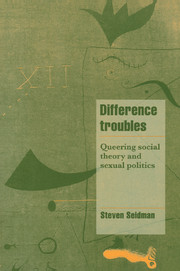Book contents
- Frontmatter
- Contents
- Preface
- Acknowledgements
- Introduction: the contemporary reconfiguring of social theory
- Part I Resisting difference: the malaise of the human sciences
- Part II Engaging difference: from lesbian and gay studies to queer theory
- Part III Democratic prospects: the politics of knowledge and identity
- 8 Transfiguring sexual identity: AIDS and the cultural politcs of sexuality and homosexuality, 1981–1986
- 9 From gay ethnicity to queer politics: the renewal of gay radicalism in the United States
- 10 Postmodern anxiety: the politics of epistemology
- 11 The politics of sexual difference in late twentieth-century America
- 12 Difference and democracy: group recognition and the political cultures of the US, Holland, and France
- Epilogue: pragmatism, difference and a culture of strong democracy
- Notes
- References
- Index
10 - Postmodern anxiety: the politics of epistemology
from Part III - Democratic prospects: the politics of knowledge and identity
Published online by Cambridge University Press: 05 October 2010
- Frontmatter
- Contents
- Preface
- Acknowledgements
- Introduction: the contemporary reconfiguring of social theory
- Part I Resisting difference: the malaise of the human sciences
- Part II Engaging difference: from lesbian and gay studies to queer theory
- Part III Democratic prospects: the politics of knowledge and identity
- 8 Transfiguring sexual identity: AIDS and the cultural politcs of sexuality and homosexuality, 1981–1986
- 9 From gay ethnicity to queer politics: the renewal of gay radicalism in the United States
- 10 Postmodern anxiety: the politics of epistemology
- 11 The politics of sexual difference in late twentieth-century America
- 12 Difference and democracy: group recognition and the political cultures of the US, Holland, and France
- Epilogue: pragmatism, difference and a culture of strong democracy
- Notes
- References
- Index
Summary
Chapter 2 of this book, “The End of Sociological Theory”, was the basis of a symposium in Sociological Theory. It initially received four critical responses. Lemert (1991) and Richardson (1991) responded as friends of “the postmodern turn.” I did not directly respond to their comments. Instead I focused my reply on clarifying the social meaning of postmodernism and further articulating its significance for sociology. I did this by means of responding to at least the key objections raised to my position by Alexander (1991) and Antonio (1991). I reprint this reply, edited and somewhat revised, because it states, as clearly as I have been able to, my perspective on the social sources of postmodern theory in the US and defends a strong notion of discursivity from a “postmodern” standpoint.
The new social movements, postmodern and democratic pluralism
I begin on a personal note. Lemert (1991) rightly points out that my views on theory have changed between Liberalism and the Origins of European Social Theory (1983) and my current writing. In the late 1970s, I believed in the notion of science as truth and in general theory as a type of social reason that must be defended as part of the defense of a democratic society. I sought to legitimate a particular sociological project: a comparative historical sociology of modernity. I was greatly influenced by my teacher, the late Benjamin Nelson, as well as the commitment to general theory I found in Habermas and in the postpositivism of my friend Jeff Alexander (1982).
- Type
- Chapter
- Information
- Difference TroublesQueering Social Theory and Sexual Politics, pp. 198 - 211Publisher: Cambridge University PressPrint publication year: 1997



